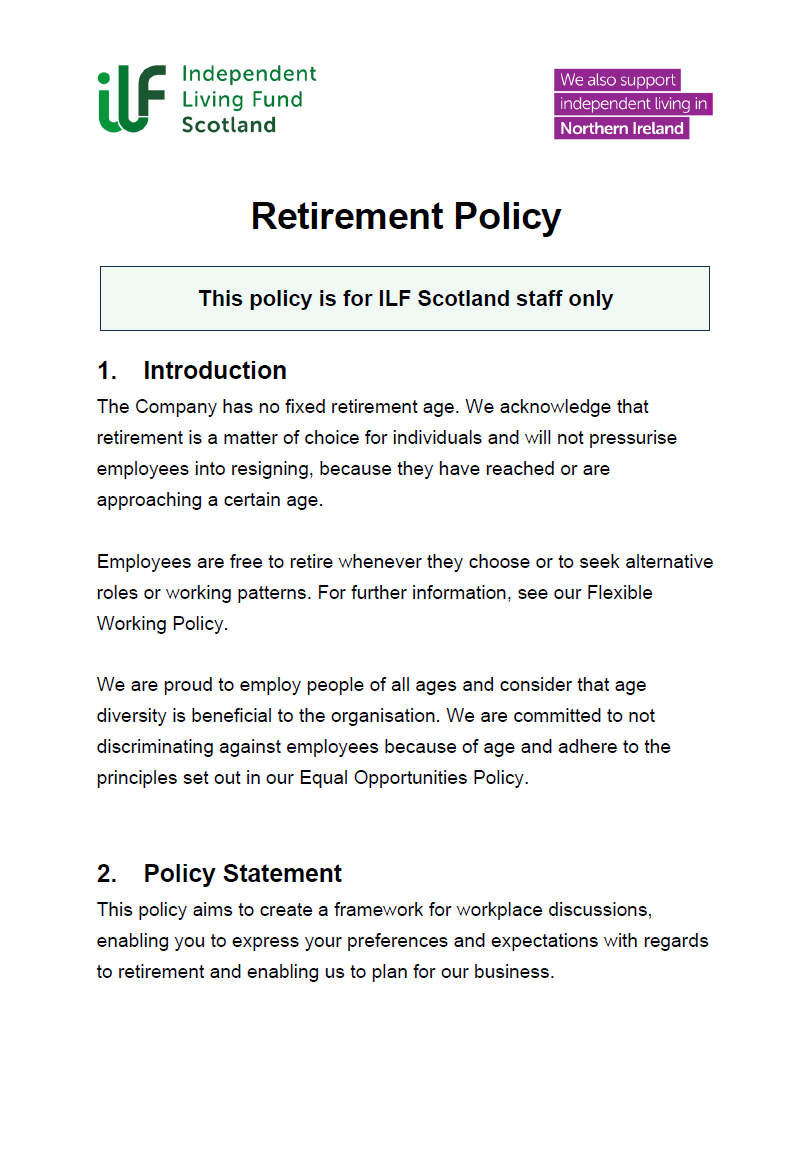
The Company has no fixed retirement age. We acknowledge that retirement is a matter of choice for individuals and will not pressurise employees into resigning, because they have reached or are approaching a certain age.
Employees are free to retire whenever they choose or to seek alternative roles or working patterns. For further information, see our Flexible Working Policy.
We are proud to employ people of all ages and consider that age diversity is beneficial to the organisation. We are committed to not discriminating against employees because of age and adhere to the principles set out in our Equal Opportunities Policy.
This policy aims to create a framework for workplace discussions, enabling you to express your preferences and expectations with regards to retirement and enabling us to plan for our business.
This policy does not form part of your contract of employment and we may amend it from time to time as we consider appropriate.
3.1 You or your manager may want to discuss your short, medium and long-term plans, as the need arises. For example, a promotion opportunity may arise, or, if your circumstances change, you may want a different working pattern or to stop work altogether. We need to plan for the business, and so may indicate to staff from time to time that it would be helpful to know what their plans are. There is no obligation for us or you to hold workplace discussions about your future plans, but it may be mutually beneficial to do so.
3.2 We will not make generalised assumptions that performance will decline with age, whether due to competence or health issues. If we think there are problems with your performance or ill-health, these will be dealt with in the usual way, through the company’s Disciplinary or Absence Policy.
3.3 If a workplace discussion takes place for the purposes described above, we will aim to make it as informal as possible. During any workplace discussion:
3.4 If you indicate that you are thinking of retiring, you are free to change your mind at any time until you have actually given notice to terminate your employment. Your employment or promotion prospects will not be prejudiced, because you have expressed an interest in retiring or changing work patterns.
3.5 If you express an interest in moving to a more flexible working pattern or changing role, we will confirm that this is what you want before any action is taken which could affect your employment, such as a change to your role or responsibilities.
Ideally employees should contact their Line Manager and HR 13 months before they wish to retire to state their intent in regard to retirement. The HR department will then arrange an individual meeting with the member of staff and their line manager, as required, up to nine months before the proposed date of retirement in order that a plan for retirement may be drawn up.
4.1.1 To assist employees and management to plan for retirement a Retirement Planning Form has been developed. This form can be used, (regardless of whether the employee is a member of the Civil Service Pension Scheme (CSPS)), for employees to set out their request or plan and provide up to 13 months’ notice, without committing themselves to a particular course of action.
To benefit from the Working Hours Reduction / Phased Retirement arrangements in Section 5.0 of this Policy, an employee needs to provide at least six months’ notice of their intention to retire.
The Retirement Planning Form should be completed by the employee to record the date this request was made.
4.2.1 Employees who have previously retired utilising the phased retirement or previous additional leave options will not be entitled to take these options again.
Four months prior to your planned retirement date, Finance will inform Civil Service Pension Scheme (CSPS) and request a retirement quote is sent to you. You should receive this quote approximately two months later along with forms for completion. Please find a link here for guidance: How to claim your pension.
To obtain a quote please call the Partnership provider (currently Legal and General) or access your online Legal and General account.
4.3.1 To claim the CSPS the employee must retire from all public sector from which pension contributions are paid.
When an employee is definite that he / she is going to retire from work, (regardless of whether he / she is a member of the CSPS, he / she must inform his / her line manager in writing).
Notification must be in accordance with his / her notice period as set out in the contract of employment.
Please note that any employee eligible to retire can provide only his / her contractual notice, but if they are in the CSPS, their pension payments are unlikely to be processed on time for the start of their retirement.
Every employee must ensure that his / her full leave entitlement is taken prior to their retirement date.
4.5.1 When an employee retires, his / her contract of employment will be terminated. If he / she wishes to return to ILF Scotland employment the employee will be required to apply for an advertised position.
4.5.2 An employee can withdraw his / her Retirement Planning Form or revise his / her retirement plan providing this is done prior to the contractual notice date. (Please see 4.4)
4.5.3 The letter required to confirm the retirement date (as per 4.4) is a legally binding document that will terminate the contract of employment and this can only be withdrawn with management agreement.
5.1 This part of the policy applies to employees with a confirmed retirement date who have given at least six months’ notice of their intention to retire.
In exceptional circumstances where the notice period is less than six months the phased retirement may be applied with mutual agreement between employer and employee.
To qualify for phased retirement, employees must have a minimum of two years of continuous service with ILF Scotland.
5.2 In order that an employee can adjust to the prospect of retirement, a gradual reduction in working hours may be introduced three months prior to retirement.
During this time employees will be paid as if at work. The specific starts and finish times and days of the week the employee is required to work are as per the needs of the service and must be agreed in advance with their line manager.
The pattern of reduced hours can only be permitted on the basis shown, that is, the paid time off cannot be aggregated over a longer or shorter period.
5.3 The Retirement Planning Form should be completed by the employee to request a phased retirement and to record the date this request was made. Line management must retain a copy of this form in the employee file and provide a copy to the payroll department.
As detailed in point 4.2.1, employees who have previously utilised a phased retirement will not be entitled to take this again. This means that any employee who returns to employment with ILF Scotland after taking phased retirement will not be entitled to this again at a later date.
As stated in point 4.5.2, an employee can withdraw his / her intention to retire providing this is done prior to the contractual notice date. Where this occurs and the employee has benefitted from part or all of a phased retirement, the individual will be required to repay any overpayment made.
ILF Scotland also operates a Flexible Working Policy. This allows any employee to request a change of working patterns.
An employee who is shortly to retire will often have considerable knowledge in relation to his / her role and responsibilities. The line manager may require the employee’s assistance and cooperation for succession planning. Prior to retirement, employees should co-operate with management, if requested to do so, by:
ILF Scotland is committed to equality and diversity in respect of the protected characteristics covered by the Equality Act 2010. These protected characteristics are age, disability (which includes mental health and people diagnosed as clinically obese), race, religion or belief, sex, sexual orientation, gender reassignment (people who are having or who have had a sex change, transvestites and transgender people), marriage and civil partnership, and pregnancy and maternity.
This is about creating a fairer society where everyone can participate and has the opportunity to fulfil their potential. It is mostly backed by legislation designed to address unfair discrimination based on membership of a particular group.
This is about recognising and valuing difference in its broadest sense. It is about creating a culture and practices that recognise, respect, value and harness difference for the benefit of the patients, carers, members of the public and members of staff.
This policy has been equality and diversity impact assessed.
We will process your data in relation to this policy for legitimate business purposes. We will also retain records of any correspondence, reports, meetings and associated documentation in relation to this policy. Such records will be retained in accordance with our Data Retention Schedule.
